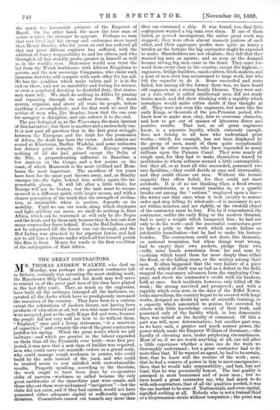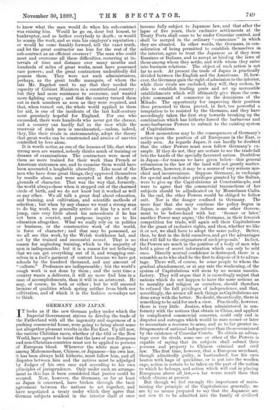THE GREAT CONTRACTORS.
MR. THOMAS ANDREW WALKER, who died on Monday, was perhaps the greatest contractor left in Britain, certainly was executing the most striking work, the Manchester Ship Canal, and his death may well serve to remind us of the great part men of his class have played in the last fifty years. They, as much as the engineers, have built all the railways, enlarged all the harbours, ex- cavated all the docks which have so prodigiously increased the resources of the country. They have been to a curious extent the refutations of modern theory, not having been products of education at all, but men who came forward and were accepted, just as the early Kings did and were, because the people did not very well see how to do without them. "England," once said a living statesman, "is a reservoir of capacities ;" and certainly the rise of the great contractors justifies his saying. When the great works which we call railways—and which are greater in the labour expended on them than all the Pyramids ever built--were first pro- jected, it was seen that a new class of builder was required, men who could carry out scientific orders on a grand scale, who could manage rough workmen in armies, who could build by the mile instead of the yard, and who could be trusted never to rest satisfied with unworkmanlike results. Properly speaking, according to the theorists, the work ought to have been done by co-operative clubs of navvies—workmen so called because the only great earthworks of the immediate past were canals, and those who cut them were nicknamed "navigators "—but the clubs did not exist, and if they had existed, would not have possessed either adequate capital or sufficiently capable dictators. Committees cannot cut tunnels any more than they can command a ship. It was found, too, that little contractors wanted a big man over them. If one of them failed, or proved incompetent, the entire great work was stopped ; they were often almost insanely jealous of each other, and their aggregate profits were quite as heavy a burden as the fortune the big contractor might be expected to make. Shareholders are not idealists ; they felt that they wanted big men as agents ; and as soon as the demand became strong, big men came to the front. They came for- ward from every class in the country, except the highest,— engineers, bridge-builders, canal-cutters, brick-makers, and a host of men even less accustomed to large work, but who felt the capacity to do it. Some succeeded and some failed, but among all the former there was, we have heard old engineers say, a strong family likeness. They were not, as a rule, what is called intellectual men, did not study books much, and did their thinking with a rapidity which nowadays would make critics doubt if they thought at all. They were not even like engineers, but more like the early Kings, or Generals of the pre-Prussian period, who knew how to make men obey, how to overcome obstacles, and how to get out of masses of labourers direct and positive results. That last, as all great engineers know, is a separate faculty, which, curiously enough, does not belong to all men who understand great works,—which, for example, has not been displayed by the group of men, many of them quite exceptionally qualified in other respects, who have expended so many millions upon the Panama Canal. They were nearly all rough men, for they had to make themselves feared by multitudes to whom softness seemed a little contemptible ; but they all, or at least all who succeeded, possessed two rare faculties,—they could decide at once and irrevocably, and they could choose out men. Without the former capacity they often failed, for they could not meet accidents. It is of no use thinking when a flood sweeps away earthworks, or a tunnel tumbles in, or a quarrel breaks out among the " nations " employed upon a line— the writer saw that once, when it took cavalry to restore order and stop killing by wholesale—it is necessary to act, act within minutes, and act rightly, or the twofold object of the contractor must be lost. For, be it remembered, the contractor, unlike the early King or the modern General, had to carry a weight which hampered him ; he had not only to do his work—and the successful contractors grew to take a pride in their work which made failure an intolerable humiliation—but he had to make his fortune besides. The contractors could not draw, like Generals, on national treasuries, but when things went wrong, had to empty their own pockets, pledge their own credit, raise funds sometimes from far and near by exertions which taxed them far more deeply than either the flood, or the falling stone, or the mutiny among their men. It often happened that the very failure of a piece of work, which of itself was as bad as a defeat in the field, stopped the customary advances from the employing Com- pany, and shook the contractor's credit with his bankers, both at once. Such incidents, however, only killed off the weak ; the strong survived and prospered ; and with a rapidity which even now, in the days of the Eiffel Tower, looks marvellous, the country began to be covered with huge works, designed no doubt by men of scientific training, or a capacity which amounted to genius, but executed by others with little knowledge except of their work, and possessed only of the faculty which, in less democratic days, was valued as the faculty of command. Of this a part was will, mere determination ; but another part was, as we have said, a greater and much scarcer power, the power which made the Emperor William of Germany,—the faculty of choosing men, under perplexing circumstances. Most of us, if we are worth anything at all, can tell after a little experience whether a man can do the work we thoroughly understand ; but a great contractor had to do more than that. If he wanted an agent, he had to be certain, first, that he knew well the routine of the work ; next, that he had a reserve of power in him to meet emergencies ; then, that he would take responsibility ; and last, but not least, that he was pecuniarily honest. The last quality is assumed in most businesses and of most men ; but we have heard a great contractor say, who had much to do with sub-contractors, that of all the qualities needed, it was the one hardest to be sure of. Testimonials, and even capital, signified nothing at all. Nobody who is not a trained thief or a kleptomaniac steals without temptation ; the point was to know what the man would do when his sub-contract was ruining him. Would he go on, dour but honest, to bankruptcy, and so bother everybody to death ; or would he scamp the work, and so ruin his employer's reputation ; or would he come frankly forward, tell the exact truth, and let the great contractor use him for the rest of the sub-contract as an efficient overseer ? The man who could meet and. overcome all these difficulties, recurring at in- tervals of time and distance over many months and hundreds of miles of great works, must have possessed rare powers ; and the great contractors undoubtedly did possess them. They were not such administrators, perhaps, as the great traffic managers, of whom the late Mr. Bagehot used to say that they needed the capacity of Cabinet Ministers in a constitutional country ; but they had more resistance to overcome, and wanted more fighting energy ; and that the country turned them out in such numbers as soon as they were required, and that, when turned out, the whole world. applied to them for aid, is one of the incidents of the last half-century most genuinely hopeful for England. For one who succeeded, there were hundreds who never got the chance, and a country can hardly fail in the race while the reservoir of such men is unexhausted,—unless, indeed, they, like their rivals in statesmanship, adopt the theory that great works can be constructed and armies of navvies controlled by love alone.
It is worth notice, as one of the lessons of life, that when strong men are wanted, nobody thinks much of training or dreams of examinations. The contractors were most of them no more trained for their work than French or American statesmen are, and. to examine them would have been accounted. a laughable absurdity. Like most of the men who have done great things, they approved themselves by results alone, and were accepted. at first chiefly on grounds of character. That was the way that, formerly, the world always chose when it stepped out of the charmed circle of birth, and. we do not know but it worked as well as any other. We all talk a great deal about education, and. training, and cultivation, and scientific methods of selection ; but when by any chance we want a strong man to do big work, we generally arrive at him by a sort of jump, care very little about his antecedents if he has not been a convict, and postpone inquiry as to his education altogether. What we really rely on in politics or business, or the constructive work of the world, is force of character ; and that may be possessed, as we all see this week, by the Welsh workhouse lad, and not by the trained and successful savant. That is no reason for neglecting training, which to the majority of men is indispensable ; but it is a reason for not believing that we can get everything out of it, and wrapping our- selves in a fool's garment of content because we have got schools by the hundred thousand, and. any amount of "culture." Professors are indispensable ; but the world's rough work is not done by them ; and the next time a country wants a deliverer, it will no more find him in a man of accomplishments, than it will in an aristocrat. He may, of course, be both or either ; but he will succeed because of qualities which spring neither from birth nor cultivation, and of which it is the fashion nowadays not to think.







































 Previous page
Previous page